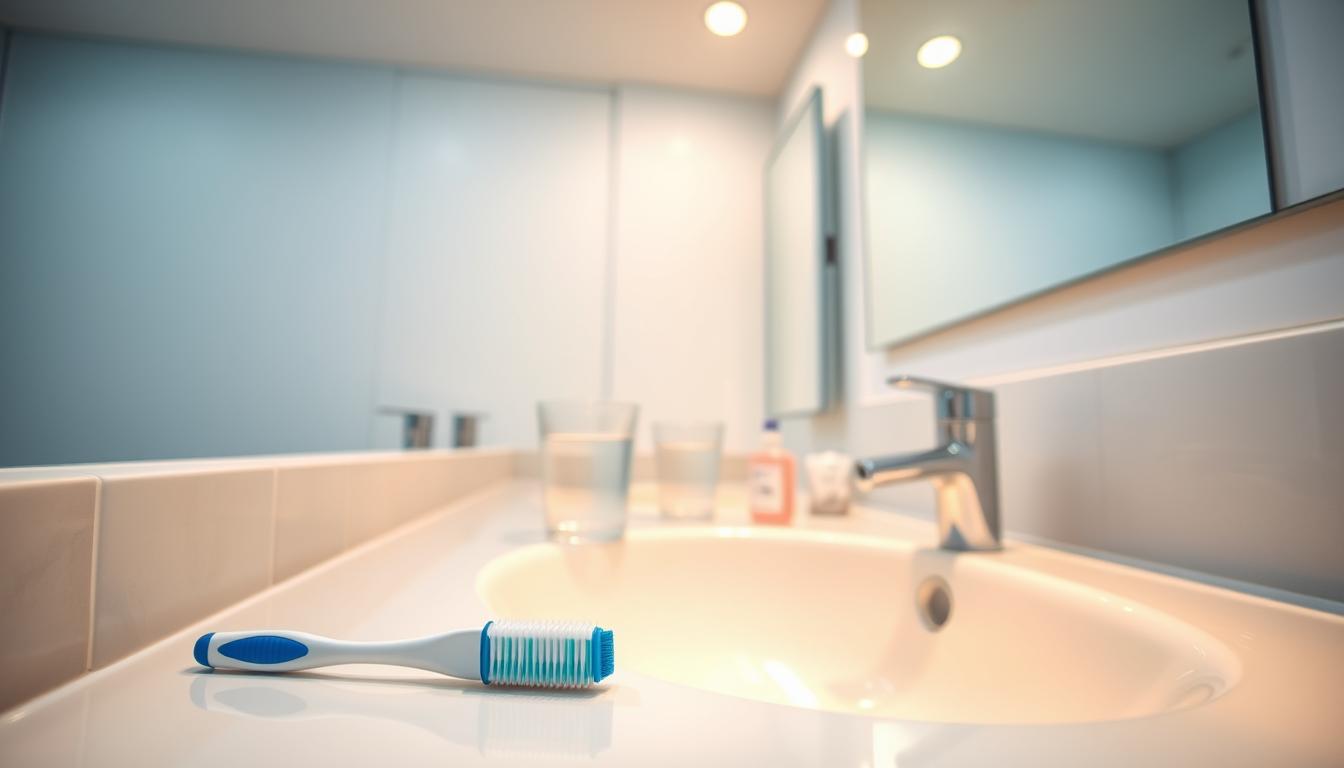Are you taking the right steps to maintain a healthy and beautiful smile? Good dental hygiene is crucial for overall health, and it’s more than just brushing your teeth.
A comprehensive approach that includes regular check-ups, proper brushing and flossing techniques, and a healthy diet is essential. By following the right dental health tips, you can keep your teeth strong and healthy for years to come.
Key Takeaways
- Understand the importance of good dental hygiene
- Learn proper brushing and flossing techniques
- Discover the role of diet in maintaining healthy teeth
- Find out why regular dental check-ups are crucial
- Explore additional tips for a healthy smile
The Importance of Dental Health
Oral health plays a vital role in our overall well-being, making it essential to prioritize dental care. Good oral health is not just about having a bright smile; it’s also closely linked to our overall health. Neglecting dental care can lead to various health issues, some of which can be severe.
How Oral Health Affects Overall Wellness
Research has shown that there is a significant connection between oral health and overall wellness. Poor oral hygiene can lead to conditions such as gingivitis and periodontitis, which are not just limited to the mouth. These conditions can have far-reaching effects, potentially contributing to heart disease, diabetes, and other systemic health issues.
Maintaining good oral health through regular teeth cleaning and preventive dentistry practices is crucial. This includes not just brushing and flossing but also regular dental check-ups to catch any potential issues early.
| Oral Health Practice | Benefits |
|---|---|
| Regular Brushing | Removes plaque, prevents tooth decay |
| Flossing | Removes food particles, prevents gum disease |
| Dental Check-ups | Early detection of dental problems, professional cleaning |
Common Dental Problems and Their Causes
Some of the most common dental problems include tooth decay, gum disease, and oral infections. These issues are often caused by poor oral hygiene, but can also be influenced by factors such as diet, genetics, and lifestyle choices.
For instance, consuming high amounts of sugar can lead to tooth decay, while smoking can increase the risk of gum disease and oral cancer. Understanding these causes can help in taking preventive measures.
By prioritizing oral health and adopting good dental hygiene practices, individuals can significantly reduce the risk of common dental problems and contribute to their overall wellness.
Best Dental Care Tips for Healthy Teeth
Good oral hygiene is the foundation of a healthy and beautiful smile. By incorporating effective dental care habits into your daily routine, you can maintain healthy teeth and gums for years to come.
Proper Brushing Techniques
Brushing your teeth is the most basic yet crucial aspect of oral hygiene. To do it effectively, you need to choose the right toothbrush and use proper brushing methods.
Choosing the Right Toothbrush
Selecting a toothbrush that fits comfortably in your mouth and has soft bristles is essential. Look for a toothbrush with a small head that can reach all areas of your mouth, including the back sides of your molars. Whether you prefer a manual or electric toothbrush, ensure it has the American Dental Association (ADA) Seal of Acceptance, indicating it meets dental standards.
Effective Brushing Methods
To brush your teeth effectively, place your toothbrush against your gums at a 45-degree angle. Gently move the brush back and forth in small circular motions, ensuring you cover all surfaces of your teeth. Brush for at least two minutes, twice a day, and don’t forget to brush your tongue and the roof of your mouth to remove bacteria.

Flossing: Why and How
Flossing is an essential part of your dental care routine that removes food particles and plaque from between your teeth and under your gumline, where a toothbrush cannot reach. To floss effectively, wrap the floss around your middle fingers, leaving about an inch of floss between your hands. Gently slide the floss between your teeth, curving it around the edge of each tooth in a “C” shape. Floss at least once a day to prevent interdental cavities and gum disease.
Mouthwash Benefits and Usage
Using a mouthwash can provide additional protection against plaque, gingivitis, and bad breath. Choose a mouthwash with the ADA Seal of Acceptance to ensure it is effective and safe. Swish the mouthwash around your mouth for 30 seconds to 1 minute before spitting it out. Some mouthwashes are designed for specific needs, such as antibacterial or fluoride mouthwashes, so select one that fits your oral health needs.
Tongue Cleaning Importance
Cleaning your tongue is often overlooked but is crucial for removing bacteria that can cause bad breath and affect your overall oral health. Use a tongue scraper or your toothbrush to gently clean your tongue from back to front. Regular tongue cleaning can improve your mouth’s freshness and contribute to a healthier oral environment.
Interdental Cleaning Tools
In addition to flossing, interdental brushes or interdental cleaners can be used to clean between your teeth, especially in areas where flossing is difficult. These tools can help remove plaque and food particles, reducing the risk of interdental cavities and gum inflammation. Consult your dentist to determine the best interdental cleaning tools for your specific needs.
Professional Dental Care and Prevention
To keep your teeth healthy, it’s essential to combine good oral hygiene practices with regular professional dental care. Professional dental care encompasses a range of services designed to prevent and treat dental issues.
Regular Dental Check-ups
Regular dental check-ups are vital for maintaining good oral health. They help in the early detection of dental problems, ensuring they can be treated before becoming serious. During these check-ups, your dentist can provide personalized dental care tips and tricks tailored to your needs.
Professional Teeth Cleaning
Professional teeth cleaning, or prophylaxis, is a deep cleaning procedure that removes plaque and tartar from teeth both above and below the gum line. This process is crucial for maintaining good oral hygiene practices and preventing gum disease.
Dental Sealants and Fluoride Treatments
Dental sealants are protective coatings applied to the chewing surfaces of back teeth to prevent decay. Fluoride treatments strengthen tooth enamel, making teeth more resistant to decay. Both are effective dental health habits that can be recommended by your dentist.
Early Detection of Dental Issues
Early detection of dental issues is critical. Regular check-ups can identify problems such as cavities, gum disease, and oral cancer in their early stages, allowing for timely intervention.
| Service | Description | Benefits |
|---|---|---|
| Regular Dental Check-ups | Examination of teeth and gums | Early detection of dental issues |
| Professional Teeth Cleaning | Deep cleaning of teeth | Removal of plaque and tartar |
| Dental Sealants | Protective coating on teeth | Prevents tooth decay |
| Fluoride Treatments | Application of fluoride | Strengthens tooth enamel |
By incorporating these professional dental care services into your routine, you can significantly improve your oral health and overall well-being.
Diet and Lifestyle for Optimal Dental Health
Your dietary choices have a profound impact on your oral health. A healthy diet not only strengthens your teeth but also helps prevent various dental problems. In this section, we will explore how different foods and lifestyle habits affect your dental well-being.
Foods That Strengthen Teeth
Certain foods are beneficial for your teeth due to their high content of calcium, vitamins, and minerals. These include:
- Dairy products like milk, cheese, and yogurt, which are rich in calcium.
- Leafy greens such as spinach and kale, which are high in vitamins and minerals.
- Nuts and seeds, which are good sources of calcium and phosphorus.
Table: Foods Beneficial for Teeth
| Food | Nutrient | Benefit |
|---|---|---|
| Milk | Calcium | Strengthens teeth |
| Spinach | Vitamin K | Promotes bone health |
| Almonds | Phosphorus | Helps rebuild tooth enamel |
Foods and Drinks to Limit
Some foods and drinks can harm your teeth if consumed excessively. These include:
- Sugary snacks and drinks that can lead to tooth decay.
- Acidic foods and beverages that can erode tooth enamel.
- Sticky foods that can get trapped between teeth.

Habits That Damage Teeth
Certain habits can damage your teeth and compromise your oral health. These include:
- Teeth grinding or clenching, which can wear down teeth.
- Using teeth as tools (e.g., opening packages), which can chip or crack teeth.
- Smoking, which can lead to gum disease and oral cancer.
Hydration and Oral Health
Drinking plenty of water is essential for maintaining good oral health. Water helps to:
- Rinse away food particles and bacteria.
- Keep your mouth moist, preventing dry mouth.
- Support the production of saliva, which neutralizes acids.
By making informed choices about your diet and lifestyle, you can significantly improve your oral health. Regular professional dental cleaning and preventive dental care practices, such as proper teeth cleaning techniques, also play a crucial role in maintaining a healthy smile.
Conclusion
By incorporating healthy oral habits into your daily routine, you can enjoy a healthy and beautiful smile for years to come. Proper tooth brushing techniques, combined with regular flossing and a balanced diet, play a crucial role in maintaining optimal oral health.
A well-structured dental care routine is essential for preventing common dental problems. Regular dental check-ups and professional teeth cleaning can help detect issues early on, ensuring timely intervention and treatment.
By making oral health a priority, you can significantly reduce the risk of dental problems and maintain a confident smile. Focus on developing healthy habits, such as proper tooth brushing techniques, and visit your dentist regularly to keep your teeth healthy and strong.

Leave a Reply